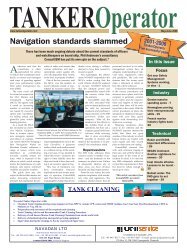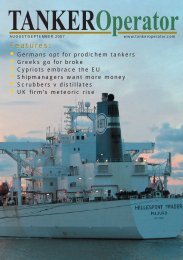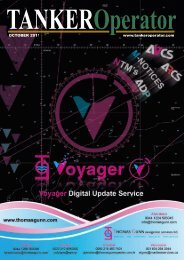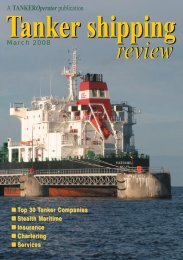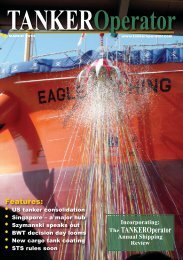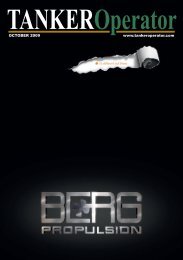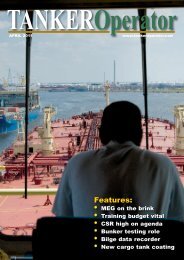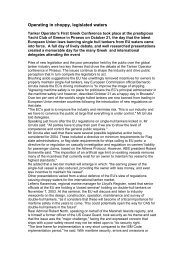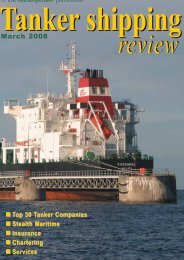Features: - Tanker Operator
Features: - Tanker Operator
Features: - Tanker Operator
Create successful ePaper yourself
Turn your PDF publications into a flip-book with our unique Google optimized e-Paper software.
TECHNOLOGY - TANK CLEANING<br />
It was also considered that cleaning<br />
persistent hydrocarbons from zinc silicate is<br />
one of the most challenging operations facing<br />
chemical/product tanker owners and operators<br />
so it could be assumed that the tank cleaning<br />
chemicals that performed the best under the<br />
conditions of the project, would most likely be<br />
some of the most effective in the market<br />
place.<br />
The efficiency of each tank cleaning<br />
chemical was monitored by means of wall<br />
washing the test panel with a fixed volume of<br />
methanol. This methanol was then tested for<br />
water miscibility (hydrocarbons) in<br />
accordance with ASTM D1722, but rather<br />
than just visually ‘passing’ 20 or ‘failing’ the<br />
sample (as stated in the ASTM procedure)<br />
the extent of the hydrocarbon failure was<br />
quantified using the L&I WAVE II UV / Vis<br />
Spectrometer.<br />
The following test protocol was agreed:<br />
1) Three zinc silicate coated test panels were<br />
fully immersed in Linear Alkyl Benzene<br />
(LAB) for 48 hours.<br />
2) The panels were removed from the LAB,<br />
flushed with cold freshwater for<br />
approximately 1 minute (in order to<br />
remove the free LAB from the surface of<br />
the test panels) and then naturally<br />
ventilated to dryness.<br />
3) The panels were then washed by recirculation<br />
using the tank cleaning<br />
chemical (at the concentration specified<br />
by the manufacturers) for 2 hours at<br />
60 deg C in fresh water.<br />
4) The panels were again flushed with cold<br />
freshwater to remove any residual<br />
detergent and then naturally ventilated to<br />
dryness.<br />
5) Each panel was then wall washed with<br />
methanol and tested for hydrocarbons<br />
using the LIM spectrometer to quantify<br />
the hydrocarbon content of the sample.<br />
The reported result was an average of all<br />
three results.<br />
It was agreed to limit the cleaning water<br />
temperature to 60 deg C, because this<br />
temperature is considered to be the lowest<br />
‘hot’ water temperature that can be readily<br />
achieved and maintained by most<br />
chemical/product tankers.<br />
The cleaning was carried out using a tank<br />
cleaning rig that LIM has made specifically<br />
for the purpose of replicating the tank<br />
cleaning action on board chemical/product<br />
tankers. The test panels were sprayed with the<br />
cleaning chemical solution, in a similar<br />
manner to the way the bulkheads of a cargo<br />
tank would be sprayed.<br />
In order to create a control (reference) for<br />
the project, the zinc silicate coated panels<br />
were initially treated in the same way as<br />
above, apart from the fact that no cleaning<br />
chemicals were added in part 3. It was<br />
expected that the cleaning effect on the test<br />
panels without using tank cleaning chemicals<br />
would be minimal and when the panels were<br />
wall washed the results would show the<br />
highest residual hydrocarbon readings.<br />
At the same time, when the panels were<br />
cleaned with the individual tank cleaning<br />
chemical solutions, the hydrocarbon readings<br />
from the wall wash samples would be<br />
expected to be significantly better. The most<br />
efficient cleaning chemical solutions would<br />
therefore be expected to show the lowest<br />
hydrocarbon readings.<br />
Cleaning chemicals from seven different<br />
THE DIFFERENCE IS OBVIOUS. SO ARE WE. OPERATIONS WITH A DIFFERENCE.<br />
EMIRATES ENVIRONMENTAL PROTECTION Co. L.L.C.<br />
A MARPOL Reception Facility in the Port of Khorfakkan, U A E<br />
Tank Cleaning/De-mucking, De-slopping, Treatment & Disposal of Oily Sludge, Slop & other petroleum waste.<br />
P.O.Box 43729, Dubai, U.A.E. Tel : +9714 397 2277, Fax : +9714 397 9212<br />
Email: eco@emirates.net.ae Website: www.ecouae.com<br />
November/December 2009 TANKER<strong>Operator</strong> 29



